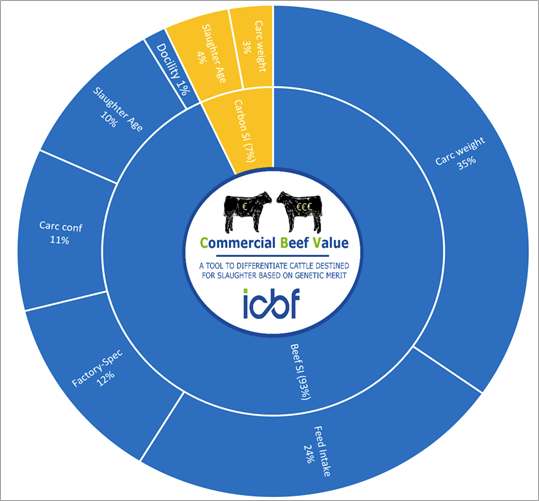The Commercial Beef Value (CBV) and the benefit that it can have has received much coverage over the last few months. While its impact will be most significant in the trading of dairy beef animals, it can also be very beneficial in the trading of suckler bred stock.
The CBV comprises traits that are of economic importance where animals are being traded for non-breeding purposes i.e. the animals will be finished by the purchaser. These “drystock” enterprises want animals with good growth rates and good conformation to generate a high value carcass. They want animals that will finish at as young an age as possible. Feed intake and docility are also important traits. Animals with low feed intake cost less to keep, while those with good docility require less labour and are safer to work with. The carbon cost is now also factored into the CBV. Figure 1 gives a breakdown of the traits included in the CBV.
How can it help in the trading of suckler animals?
Suckler bred animals are generally sold after weaning which is, for the most part, from 7-8 months of age and upwards. At this age, they have had a chance to mature and express their genetic potential for traits such as growth and conformation. A visual assessment of these animals will give a good indication as to their growth and muscling potential. But, looks aren’t everything.
Take the example of a farmer purchasing suckler weanlings in the mart next October/November. There could be multiple lots pass through the ring where the animals are of a similar age, breed, weight and conformation. In the absence of a genetic value, the farmer will have to make their decision based on a visual assessment alone. The heaviest animals which may leave the highest value carcasses at finish, may not be the most profitable. The CBV looks at the overall profitability. Feed Intake and Age at Finish can have a huge impact on the cost of taking animals through to finish. Table 1 compares two suckler bred weanling bulls purchased by a farmer on the same day and finished as steers.
Both animals were born in February and purchased in November at 9 months old. Both were the same weight, but animal A had better conformation hence the higher price/kg. They were castrated and stored for the first winter and went to grass the following March at 13 months old. Meal was introduced at grass in August (18 months old) and animals were housed at the start of October before a target finish date in November at approximately 21 months.
Animal A took 15 days longer to finish and had a 1kg higher daily feed intake which resulted in a €75 higher feed cost while on the farm. It had a 20kg heavier carcass and was one grade better on conformation giving a €0.06 higher price/kg, which meant a €131 difference in carcass value. If looking at the purchase price and sale price in isolation, you would say that animal A justified its €100 higher purchase price, as it delivered €131 more in carcass weight. Input costs are just as important as revenue. Animal B had a lighter and lower grading carcass, but still left more profit for the farmer.
The traits which made the difference in this example are feed intake and age at finish. These cannot be easily assessed by simply looking at an animal. With genomic evaluations and the availability of the CBV on mart boards, farmers can make much more informed purchasing decisions. Yes, a visual assessment of an animal is still important, but access to a genetic value in the form of the CBV will give farmers an extra tool when buying animals.
The CBV details for a herd can be accessed by farmers via their HerdPlus logins. Once logged in, go to the ‘View Profiles’ dropdown. Then select ‘Commercial Beef Value (CBV)’. If purchasing animals in a mart, the CBV details will display on the board for the relevant animals where the animal is genotyped and seller is in HerdPlus. For any queries on the CBV, please contact ICBF on 023-8820452 or email [email protected].


